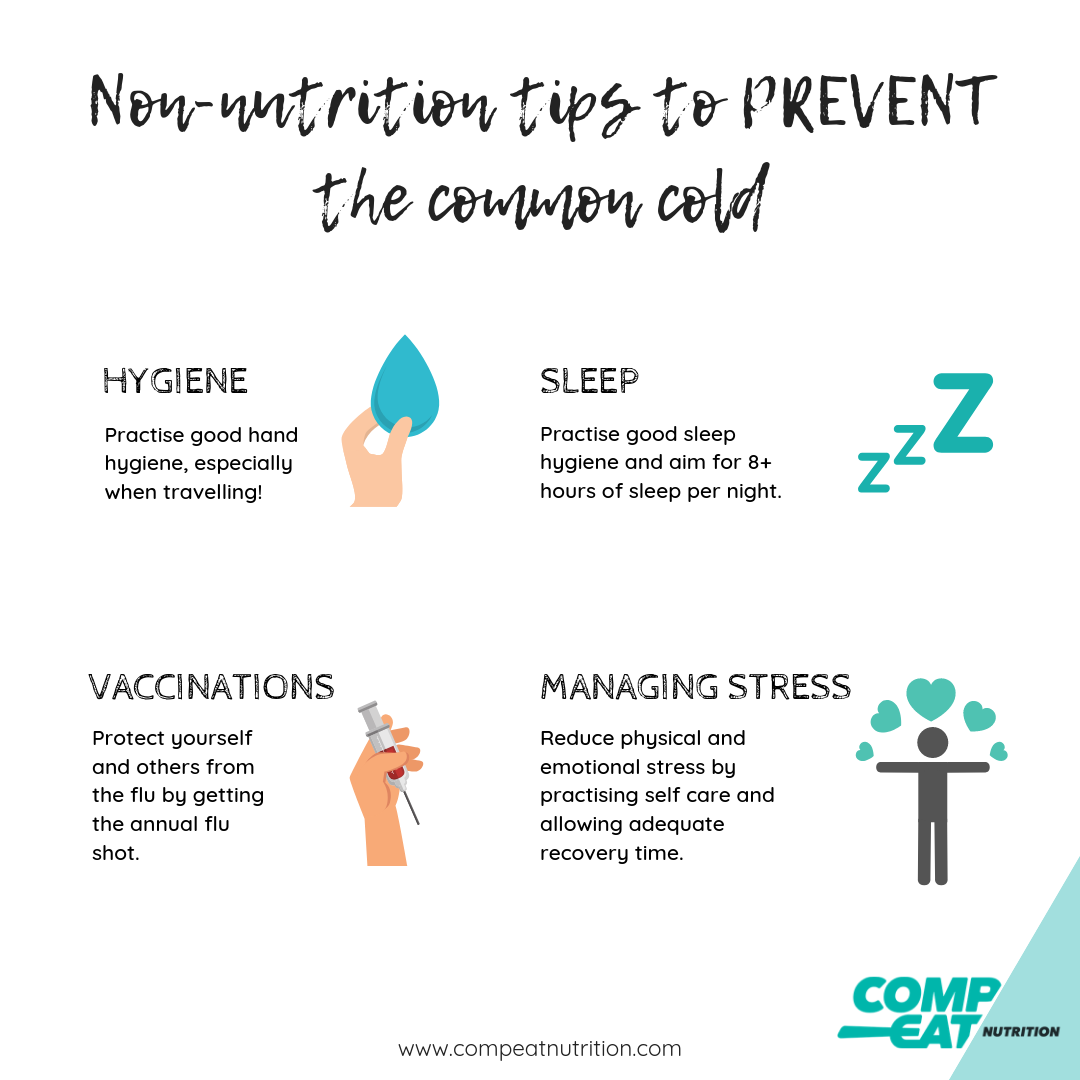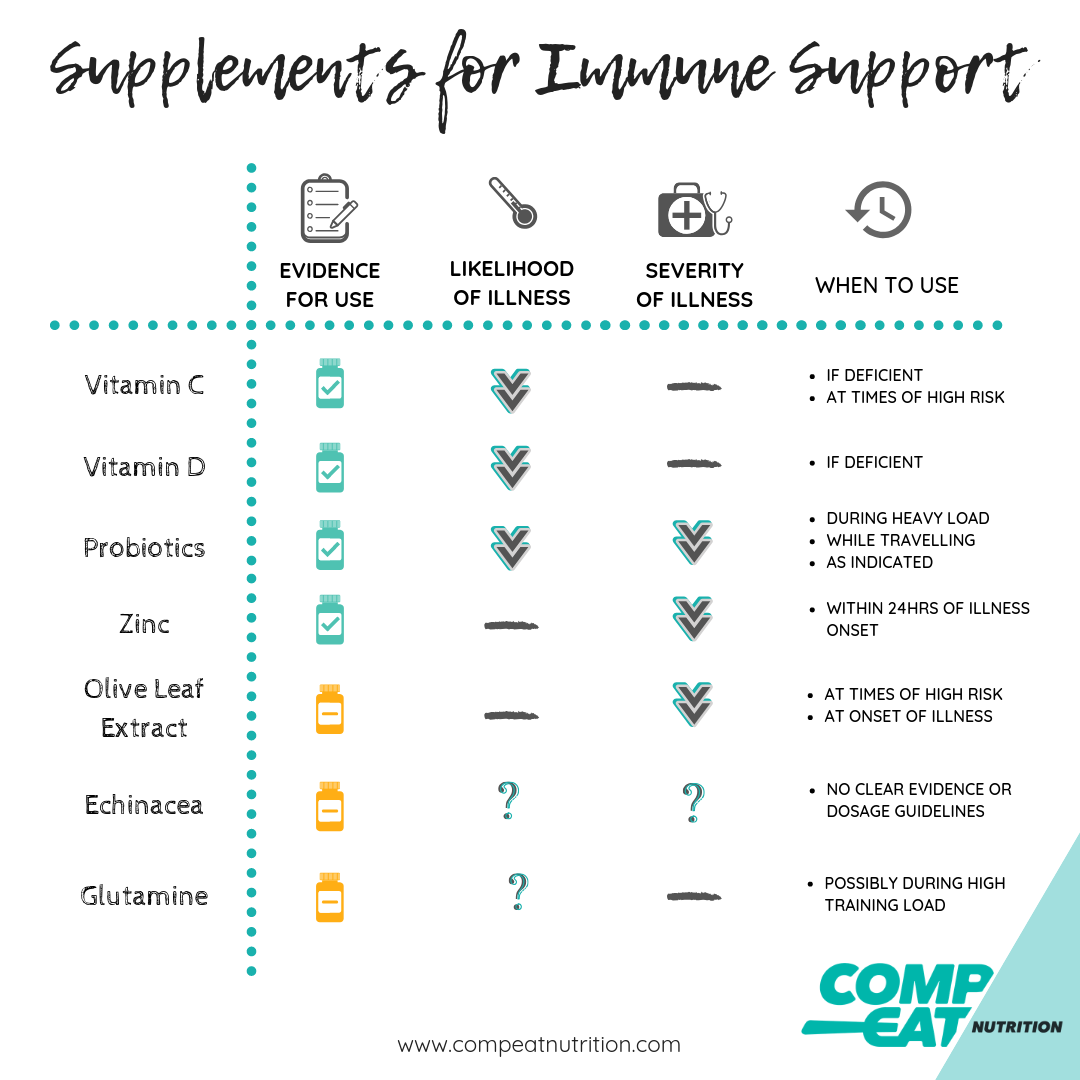Nutrition and Immunity – The Strategies that ACTUALLY work!
Welcome to Winter! As the days get shorter and colder, we know it’s time to rug up and put on our best winter attire (aka Ugg boots and trackies)! Yet, it’s also a prime time to think about our immunity too. What measures can we put in place to get us back to work, sport and every-day life as soon as possible if we do get sick, or better yet – how can we help prevent getting sick altogether?
These are two commonly asked questions we receive at this time of year. So, let’s take this opportunity to review the little things that we can do to help strengthen our immune system. We’ll go back to the basics, and we’ll also review supplements that may beneficial to throw in the mix.
The Prevention Basics
Eat the rainbow:
When aiming for your 2 serves of fruit and 5 serves of vegetables each day, remember to include a wide variety of colour (think dark green, purple, orange, yellow and red). This will ensure you are hitting your micronutrient and antioxidant requirements in order to strengthen your immune system and help combat free radicals in the body.
Optimise training nutrition:
Ensure you are fuelling sufficiently with carbohydrates during training and recovering adequately with protein and carbohydrates post-training.1 This will help to reduce stress on the body and maintain immune function. To check if, when and how to fuel adequately, have a look at our videos on training nutrition.
Nutrition and hydration are not the only factors to consider when strengthening your immune system to prevent the common cold. There are also a few other basic strategies to be conscious of:

Supplement Top-ups
Once we’ve got the basics sorted, what else can we do to support our immune system?
This is where supplements might play a role! There are a lot of supplements out there that claim to support immune function; some with more evidence than others – making it a tricky space to navigate!

Vitamin C
Vitamin C is an essential water-soluble vitamin and antioxidant that plays an important role in immune function and preventing illness. While vitamin C can help to reduce the likelihood of illness, taking high doses (in tablet form) over a long period of time, has the potential to actually blunt training adaptations and hence progress. Therefore, Vitamin C tablets should only be taken if deficient or during high-risk periods (e.g. while travelling or prior to big competitions/training periods). Food sources of Vitamin C, from a wide variety of fruits and vegetables, do not have this same negative effect to adaptations, so should be the preferred method of meeting Vitamin C requirements.2,3
Vitamin D
Vitamin D is a fat-soluble vitamin that influences several aspects of immunity and can reduce the likelihood of becoming sick. Although small amounts can be obtained from food, sun exposure is the most readily available source of Vitamin D. Natural sources of Vitamin D are usually adequate and therefore supplementation is not recommended for everyone (particularly as it is fat-soluble and can be stored – so any excess can become an issue).
However, some people may be at higher risk of Vitamin D deficiency, including those with dark skin or people who have limited sunlight exposure (e.g. office workers!). Remember that Vitamin D supplements should be taken only if deficient and under the guidance of a qualified Medical Practitioner.2
Probiotics
Probiotics are living microorganisms that can influence our gut bacteria balance. There is moderate evidence to suggest that probiotics can play a role in reducing both the likelihood and severity of illness. Although found naturally in fermented soy products, dairy and vegetables (e.g. tempeh, yoghurt and sauerkraut), probiotic supplementation can be used as a top up or additional support. Probiotic supplementation may be particularly beneficial during high-risk periods such as when travelling or during heavy training blocks.2
Zinc
Zinc is an essential mineral that plays a crucial role in DNA synthesis and immune function. If you can catch your illness at its onset with Zinc, you may just reduce the severity and duration of your cold. However, there is no evidence to support zinc supplementation for preventing the likelihood of illness, and in fact, long-term supplementation can decrease immune function (so should be avoided). Take zinc in the first 24hrs after the onset of illness for best outcomes, and only use it for the duration of your cold.2,3
Olive Leaf Extract
Olive Leaf Extract is derived from the leaves of olive trees but should not be confused with olive oil. This supplement is high in polyphenols, which are known for their antioxidant and anti-inflammatory properties. Although Olive Leaf Extract may have some role in reducing the severity of illness at the onset of a cold, further research is needed to understand the exact benefits and way that it actually works.2
Echinacea
Echinacea is a herbal supplement claimed to enhance immunity. There is some evidence to suggest that echinacea may assist in reducing the likelihood and severity of colds. However, due to the limitations of current research and conflicting findings, clear dosage guidelines for Echinacea are yet to be developed. 2,4
Definitely a supplement to watch – so it isn’t a no, just a ‘not sure’ at this stage!
Glutamine
Glutamine is a non-essential amino acid (i.e. our body can create this amino acid without needing to consume it from food) and is important for immune cells. Although there is limited evidence regarding the benefit of glutamine supplementation, there is some research to suggest that it may be beneficial in reducing the likelihood of illness in endurance training / events.2,5
Recap Time!
To optimise your immune system, there are some basics to look after as an overarching rule first:
- Eat a variety of food with plenty of colour;
- Fuel in and around training when load is high or as you are approaching a key race/event
- Aim to stay hydrated daily
- Prioritise your sleep;
- Practice good hygiene; and
- Manage stress as much as possible – whether this be from work, training, life.
Despite our best prevention measures, sometimes getting sick is inevitable. For individualised guidance, seek the expertise of a qualified Medical Practitioner, Accredited Practising Dietitian and/or Pharmacist.
Reference List
- Gunzer, W., Konrad, M., & Pail, E. (2012). Exercise-Induced Immunodepression in Endurance Athletes and Nutritional Intervention with Carbohydrate, Protein and Fat – What Is Possible, What Is Not? Nutrients, 4(9), 1187–1212. https://doi.org/10.3390/nu4091187
- Maughan, R., Burke, L., Dvorak, J., Larson-Meyer, D., Peeling, P., Phillips, S., … Engebretsen, L. (2018). IOC consensus statement: dietary supplements and the high-performance athlete. British Journal of Sports Medicine, 52(7), 439–455. https://doi.org/10.1136/bjsports-2018-099027
- Australian Institute of Sport. (2019). The AIS Sports Supplement Framework. Belconnen, ACT: AIS.
- Kim, H. (2011). Glutamine as an Immunonutrient. Yonsei Medical Journal, 52(6), 892–897. https://doi.org/10.3349/ymj.2011.52.6.892
- Karsch-Völk, M., Barrett, B., Kiefer, D., Bauer, R., Ardjomand-Woelkart, K., & Linde, K. (2014). Echinacea for preventing and treating the common cold. The Cochrane Database of Systematic Reviews, 2, CD000530.

ALICIA EDGE HEAD SPORTS DIETITIAN
Alicia is the head Advanced Sports Dietitian at Compeat Nutrition. She is also a mum and triathlete, so advice extends beyond the basics and is instead focused on providing effective and achievable nutrition for both training and racing.